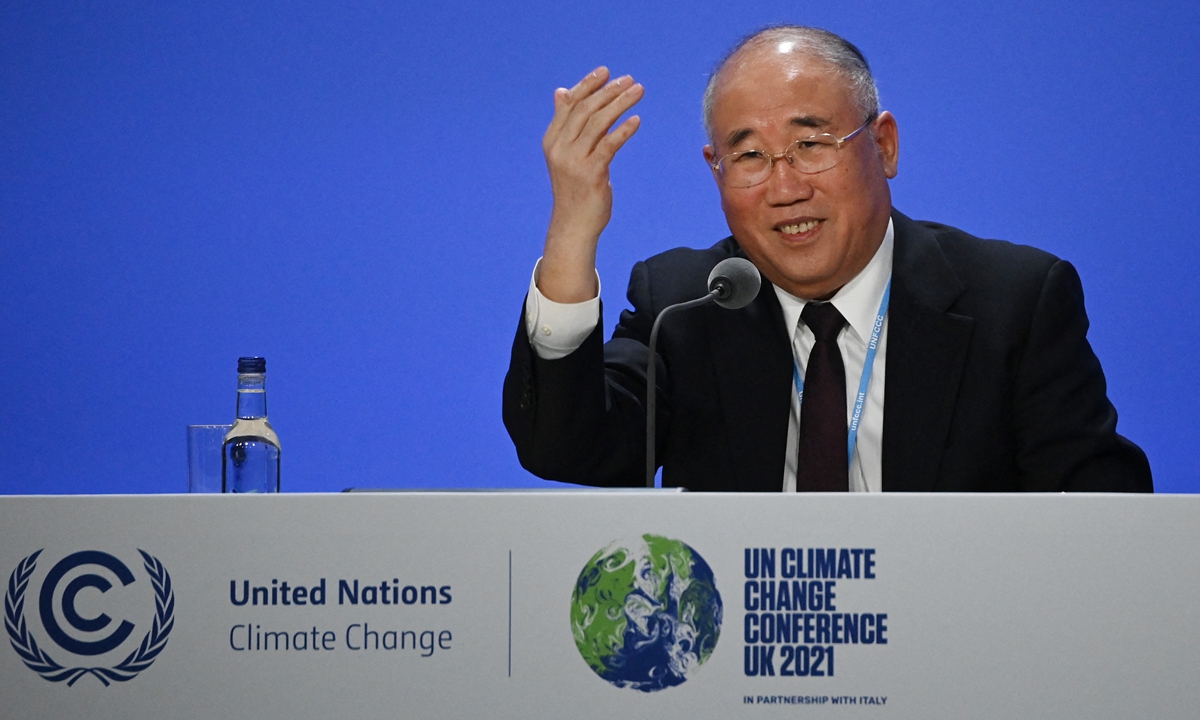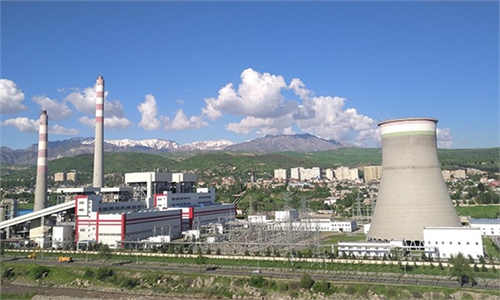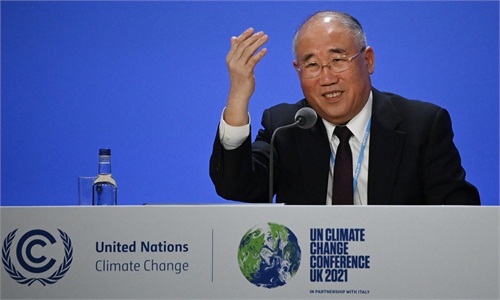
China's Special Envoy for Climate Change, Xie Zhenhua speaks during a joint China and US statement on a declaration enhancing climate action during the COP26 climate change conference in Glasgow on November 10. Photo: AFP
China and the US issued the joint declaration on climate issues out of the blue, which has surprised international public opinion. The general atmosphere of China-US bilateral relations is bad and mutual strategic distrust exists. However, the two sides can release a joint declaration to reiterate the Paris goal of keeping the global temperature rise "well below" 2 degrees Celsius and striving for 1.5 degrees, and to emphasize the significance of stepping up actions in the next crucial decade at a time when all parties are full of pessimism about the COP26 UN Climate Change Conference in Glasgow. This is indeed greatly inspiring.The joint declaration doesn't state a new quantitative emissions reduction target, but confirmed the significance of controlling methane emissions. China has promised to formulate an action plan to control and bring down methane emissions in the 2020s. This is the latest contribution China has decided to make. For China, a promise is worth a thousand ounces. It is highly predictable that China will translate this promise into national action.
China is currently the largest carbon emitter. But morally, China doesn't owe anything to the UN's climate actions. First of all, as a country with the largest population in the world, China's historical emissions were small. With its modernization drive, China will inevitably see a peak period of carbon emissions. This is a necessary guarantee for Chinese people's human rights. Second, China is the world's factory. Many of the high-carbon products used in the West are manufactured in China. China's carbon consumption is also the world's consumption.
What is equally important is that China attaches great importance to accelerating its transition to a green economy. We have not only committed to achieving peak carbon emissions by 2030 and carbon neutrality by 2060, but have also taken real actions for a long time. China's dual control system on energy consumption and energy intensity has been carried out seriously as a key national policy. In other words, one of the most important fights against climate change is taking place in China, and the effective implementation of this battle was successfully guaranteed by the capacity of China's system and the country's determination.
Yes, perhaps one day when writing the history of climate action, people will say that it was fortunate that when this action was carried out, "the world's factory" that produces high emissions was in China, not in some other country that may or may not fulfill its commitment to reducing emissions.
This joint declaration proves one thing: Despite their huge differences, China and the US can find common ground for cooperation in certain key areas. However, there are not many signs to support people's optimistic predictions: Whether this cooperation is an isolated instance or sets an example for other areas in China-US relations remains unknown.
Both China and the US have a positive attitude toward cooperation on climate action, but have different political considerations in this attitude beyond climate issues. China hopes that climate cooperation will lead to a resolution of the stalemate between the two countries in other areas, while the US anticipates that climate action will set limits on China's further development and take climate cooperation out of the larger picture of China-US relations. However, things are not going to go the way one side wants. Instead, it will be a complex game.
Back to the climate change itself, it was also China and the US that had reached an agreement before the signing of the Paris agreement, which had cleared the way for achieving a breakthrough at the Paris climate conference (COP21). But China has kept its promises, while the Trump administration broke its own, and withdrew from the Paris agreement. Now that China and the US have issued another joint declaration on enhancing climate action, it can be expected that the two sides will work together to push COP26 to success. In the long run, however, it is the US that remains the most uncertain factor.
There will be two general elections in the US in the next 10 years, and it's highly likely the Republicans will win at least one of them. The last thing all countries want to see is that when everyone is working to realize the goal of keeping global temperatures "well below" a 2-degree Celsius rise and striving for 1.5 degrees, the US will abruptly backtrack on the climate deal and abandon other countries again. This sounds like a conspiracy to deceive the world, but the US could really do such a thing.
So the Biden administration can't just mobilize and pressure other countries. It also needs to make an effort to promote the formation of irrevocable legal protections at home for the US' climate commitments, so that the commitments of the current administration will truly become the country's permanent commitments. Otherwise, the world will not know whether we are dealing with a responsible great power or a liar.


